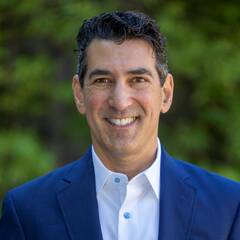putting kindness at the center
09/22/2023 10:00:00 AM

Putting Kindness at the Center
Sermon, Rosh Hashanah
September 16, 2023
Near the end of the Torah, almost at the end of the Book of Deuteronomy, Moses instructs the community that every seventh year, they are to gather during Sukkot. “Hak’heil et ha-am,” Moses says. “Gather the people—men, women, children, and the strangers in your communities—that they may hear and so learn to revere the Eternal your God and to observe faithfully every word of this Teaching.”
God and Moses knew that there is something special, sacred, and transformative about gathering as a community, especially to do something holy. So here we are, the first of the new year—some of us for the first time, and some of us for maybe the ninetieth time—ready to do sacred acts.
“Hinei mah tov umanayim,” we sing. How good it is—and how special—to gather as one with family, friends, and community. Those words, from the Book of Psalms, reflect values that go back to the origins of our people, two to three thousand years of elevating the virtue of gathering in community.
If there was one thing I learned during the three-and-half years since the beginning of the pandemic, it is not to take the virtue of gathering in community for granted. What a blessing it was that we learned to gather virtually— mark holy moments, days, and seasons together—but, there is nothing like being in person.
In many ways it is easy to minimize how terribly hard these last three-and-a-half years have been. The social and psychic cost of not gathering communally exacted a very high toll. And societal trends that pre-dated Covid were exacerbated by the pandemic. We are experiencing a genuine mental health crisis in our country with more and more people reporting that they are less happy. And articles by noted writers try to answer questions like, why have Americans become so sad and so mean? Journalist David Brooks recently wrote about the plummeting of social trust, the rise in hate crimes, and a generalized manifestation of that which is well, mean. “The words that define our age reek of menace: conspiracy, polarization, mass shootings, trauma, safe spaces,” he writes.
Brooks tries to pinpoint what’s going on. “The most important story about why Americans have become sad and alienated and rude, I believe, is also the simplest: We inhabit a society in which people are no longer trained in how to treat others with kindness and consideration. Our society has become one in which people feel licensed to give their selfishness free rein.” He continues, “In a healthy society, a web of institutions—families, schools, religious groups, community organizations, and workplaces—helps form people into kind and responsible citizens, the sort of people who show up for one another. We live in a society that’s terrible at moral formation.”
When that is combined with an alarming increase in societal polarization, we see elevated levels of both the meanness of our society and the social alienation that so many of us feel. “If you put people in a moral vacuum, they will seek to fill it with the closest thing at hand,” Brooks explains. “Over the past several years, people have sought to fill the moral vacuum with politics and tribalism. . . . People who feel isolated and under threat flee to totalizing identities.”
Isolation and loneliness also have other debilitating effects. As Nicholas Kristoff wrote in The New York Times recently, “Loneliness crushes the soul, but researchers are finding it does far more damage than that. It is linked to strokes, heart disease, dementia, inflammation and suicide; it breaks the heart literally as well as figuratively.” We’re growing more lonely as a society, to the extent that a majority of Americans report experiencing loneliness.
Friends, now, more than ever, we need to gather and drink from the wisdom of our Jewish heritage. In a secular society that has degraded public speech and diminished the collective sense of communal responsibility and connection, we are a community that can be an antidote. The synagogue, in so many ways, is an aspirational idea—a beautiful effort to bring people together and look into each other’s eyes and recognize the shared humanity between us. We’re hopeful together, we’re vulnerable together, and we share what keeps us up at night. We mark happy and joyful moments in our lives and we celebrate them as a community. On any Friday night we might be sanctifying happy moments in people’s lives, and by doing so in community, we elevate the sense of joy all around. We may walk into the chapel or sanctuary as individuals, but we walk out as members of a community, and we feel the difference in our hearts.
When we do it right, synagogues are incredibly important communal houses of meeting, prayer, and study. We model for each other so many things that are in markedly short supply right now. We model civil speech by treating each other with civility and respect, even when we disagree. We model listening—really listening—to the other. We model caring about one another. We model showing up for each other.
And we model that morality is more than talk. It’s about doing. As a synagogue community, we go out into the world beyond our walls to touch the lives of others. That’s what the pursuit of tikkun olam is about. There are not many institutions where a twelve-year-old and an eighty-year-old can do the same act, talk to each other, and learn from each other. Where else but the synagogue would you see bet mitzvah students interviewing ninety year olds for their bet mitzvah projects and learning about Jewish history directly? Where else do you see twelve year olds writing cards to people two and three generations older? We are a place that engages in the forming of morals.
Moral formation, as David Brooks writes and I concur, “comprises three things. First, helping people learn to restrain their selfishness. How do we keep our evolutionarily conferred egotism under control? Second, teaching basic social and ethical skills. How do you welcome a neighbor into your community? How do you disagree with someone constructively? And third, helping people find a purpose in life. Morally formative institutions hold up a set of ideals. They provide practical pathways toward a meaningful existence: Here’s how you can dedicate your life to serving the poor, or protecting the nation, or loving your neighbor.”
That’s what we do here at Peninsula Temple Sholom. We’re certainly not always perfect. There are ways we can do better and expand what we do, and we’re constantly looking for those opportunities. Together, you and me—we—try to give people the vocabulary, the vision, and the means to grow in moral thought and action.
I want my message this morning to be more than a sermon. I want to build a movement—of engaging deeply in the life of each other and this synagogue. Because after three and a half years of living with Covid, we need to relearn how we engage each other. We need to relearn the very act of leaving home to come do something with other people, if we are physically able and it is safe to do so. We need to relearn to have conversations over food or drink that we don’t get to do when we’re on Zoom for a meeting or class, or livestreaming a service.
The commentary to the biblical passage I began this sermon with reads as if it were written for our times. Maimonides, the great twelfth century physician, philosopher, Talmudic scholar and biblical commentator, writes that the mitzvah to gather is not just to gather for inspiration—I show up at a service and I’m inspired—rather, it is that I am inspired through the gathering, because I bring my full self to the gathering. It’s flipping the cause and effect.
I’m inviting all of us to be integral parts of this year of re-engagement. I’m asking us to double down on our values and be builders of our culture of belonging. Every one of us—whether we are 27 or 87—wants to be noticed, wants others to know our name, wants to feel heard, and wants to feel needed by the congregation. Let’s make it so!
Our Board of Trustees and our Membership Engagement and Recruitment committees are hard at work strengthening our community by making sure we integrate our new members, feel accessible to non-affiliated people looking to connect, and engage our current members in new ways. What I’ve learned in almost thirty years as a rabbi is that, in synagogue life, relationships and connections matter more than anything else.
In a moving column upon his retirement from the synagogue rabbinate, David Wolpe wrote, “Sometimes it seems, for those outside of faith communities, that religion is simply about a set of beliefs to which one assents. But I know that from the inside it is about relationships and shared vision . . . Religion may be on the decline in this country and in the West, but if you wish to see the full panoply of a human life, moments of ecstatic joy and deepest sorrow, the summit of hopes and the connections of community, they exist concentrated in one place: your local house of worship.”
The key to the movement I’m asking us to build is chesed, or kindness. With chesed as a theme this year, I’m encouraging us to step onto our campus with the intent of manifesting kindness toward other people. As Chronicle columnist Kevin Fisher-Paulson, writes, “‘Be Kind.’ We all nod our heads at that sentiment because, after all, who’s against kindness? . . . “So I’m no longer aiming for Easy Kindness. Like when we sit on a bench and do no harm. Or we keep our hands clean.” Rather the writer advocates for Advanced Kindness—which means planing our day around empathy. “When we go to the ATM, we might withdraw an extra 20 to hand to that woman living in a tent with her dog. We let that person get ahead in line of us at Safeway.
“Fortunately for me,” he continues, “Advanced Kindness does not require perfection, but rather intention. We are each of us threads of the same cloth, so any time we are kind to another, we are kind to ourselves.”
Maybe kindness is like a healing balm for the rough times we’re living in. Like many of us, my wife and I streamed some wonderful programming that came out during the pandemic. None made me smile like Ted Lasso. In an early episode, the American soccer coach faces a skeptical gaggle of British reporters and is asked to describe his goals as a soccer coach. Instead of articulating more traditional metrics of coaching success, Coach Lasso says, “For me, success is not about wins and losses. It’s about helping these young fellas be the best versions of themselves on and off the field.”
So, it’s my goal this new year to help all of us become not just the best versions of ourselves, but the best version of a connected, kind, and respectful community. May we leave this sanctuary today with a renewed commitment to kindness in all aspects of our lives, so that we may work to make our world a holier place. Shanah Tovah.
---------------------
Footnotes forthcoming.






